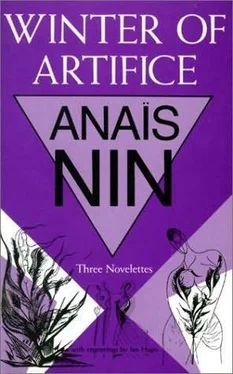Anaïs Nin - The Winter of Artifice
Здесь есть возможность читать онлайн «Anaïs Nin - The Winter of Artifice» весь текст электронной книги совершенно бесплатно (целиком полную версию без сокращений). В некоторых случаях можно слушать аудио, скачать через торрент в формате fb2 и присутствует краткое содержание. Год выпуска: 2007, Издательство: Sky Blue Press, Жанр: Классическая проза, на английском языке. Описание произведения, (предисловие) а так же отзывы посетителей доступны на портале библиотеки ЛибКат.
- Название:The Winter of Artifice
- Автор:
- Издательство:Sky Blue Press
- Жанр:
- Год:2007
- ISBN:нет данных
- Рейтинг книги:4 / 5. Голосов: 1
-
Избранное:Добавить в избранное
- Отзывы:
-
Ваша оценка:
- 80
- 1
- 2
- 3
- 4
- 5
The Winter of Artifice: краткое содержание, описание и аннотация
Предлагаем к чтению аннотацию, описание, краткое содержание или предисловие (зависит от того, что написал сам автор книги «The Winter of Artifice»). Если вы не нашли необходимую информацию о книге — напишите в комментариях, мы постараемся отыскать её.
“A handful of perfectly fold fables, and prose which is so daringly elaborate, so accurately timed… using words as magnificently colorful, evocative and imagist as any plastic combination on canvas but as mysteriously idiosyncratic as any abstract.”
—
The Winter of Artifice — читать онлайн бесплатно полную книгу (весь текст) целиком
Ниже представлен текст книги, разбитый по страницам. Система сохранения места последней прочитанной страницы, позволяет с удобством читать онлайн бесплатно книгу «The Winter of Artifice», без необходимости каждый раз заново искать на чём Вы остановились. Поставьте закладку, и сможете в любой момент перейти на страницу, на которой закончили чтение.
Интервал:
Закладка:
“And meanwhile everybody laughs, jeers and calls us all kinds of names.”
What softness. To lie on a wave. The marvellous silence—two women, one woman becoming plants. To turn over and watch the rivulets of shadows between the breasts, to lie on the down of the bed sleeping over one’s own body, like sleeping in the forest at night. The marvellous silence of woman’s thoughts, the secret and the mystery of night and woman become air, sun, water, plant. Feel the roots resting in the soil, the feet well planted in the coolness, in the brown pressure, firm against this creamy wall of earth. When you press against the body of the other you feel this joy of the roots compressed, sustained, enwrapped in its brownness, with only the seeds of joyousness stirring. A pleasure ebbing back and forth. Sun pressed luxuriantly against the body. Mystery and coolness of darkness between the four walls of another’s flesh. The back of Lilith, this soft, musical wall of fleh, the being floating in the utter waves of silence, enclosed by the presence of what can be touched. No more falling into space. No more quest, anxiety, seeking, yearning, turning, within this compact wall of tender flesh. Touch the delicate tendrils of hair, you touch moss and an end to hunger. This hand holds a strand of hair, the world complete, reduced, in the palm of the hand. You have entered from the dissonances of the street, from the separate, hard fragments walking without legs or head or arms, always mutilated, into the immense vault of an organ chant. Djuna lay at the centre of a wheel. Lilith warm and near. Or Hans talking rumblingly into her ear. The earth turns with a chant of roundness, fullness. It turns into a smooth, full round of plenitude. The spokes pass fast and are not seen at this moment. Only the drunkenness of rotation. Other days the wheel slows down and one gets caught in the spokes. One falls between them, they cut and mangle one. You are caught. The rhythm broken, you dangle, you are dragged, you are mutilated.
The steps of Georgia at the door. A voice with a mustache, the heavy pounding of her enormous feet. Her hands about to strike. Her breath like a beaver, her feet like giant ducks’ feet, her hands slapping the air. When she entered the room of the Voice it was like an attack. Thrusting herself into it as if her shoulders would hatchet down the obstacles.
She made the room seem small. She was not talking to the Voice, but smelling him, breathing over him, with her tongue flicking constantly over the wet lips, as if she had just finished eating him and were seeking the flavor again with her saliva.
Her lips were wet with appetite. She breathed, she snorted, warm and musky. She sat down as a gorilla sits on a branch with her arms ready to climb. When she said: I love , it was incongruous. She ought to have said: I am hungry. I am thirsty.
She had hair on her upper lip, hair in her nose, and hair like seaweeds on her head. The Voice was haunted by the vision of this hair, imagined that she might have hair inside her too, that her sex must be lined like the backs of sea-urchins.
She was very angry because the Voice had not answered her telephone call during the night. She had needed him desperately.
“I never answer the telephone at night,” said the Voice.
“And why not?”
“Because everyone would telephone at night. That is the moment when everyone feels the solidtude. Didn’t you ever sit by a telephone at night when in anguish and feel like calling some one, just to hear a voice? At night people don’t resist their impulses, their obsessions. One feels like addressing another human being just to make sure one is still among them.”
“That’s true. But I called for a more important reason. I have to conduct my orchestra to-morrow, and I have a new obsession. If you don’t help me somehow I’ll never be able to conduct. There was a story about my father which I didn’t tell you yesterday. I remembered it as son as I left you. When I was a girl I knew about his affairs with women. He confided in me. I knew exactly how he behaved, and the most cynical details. There are times even now, when I am making love, I suddenly become aware that I am acting like my father, I feel like him at the moment. One of his favorite amusements was to come to my door in the morning to wake me up, because I was lazy and found it hard to get up. He would knock very hard with his stick, then say: ‘Guess what I’m knocking with, guess!’ At first I didn’t. I laughed without knowing. Then one day I understood his laughter. For years this caused me a great shock. I used to hear this knocking of my father in my dreams. Then I forgot about it. I became an orchestra leader. One day, wanting to amuse a woman I loved, I knocked at her door with my orchestra baton: guess what I am knocking with? That night while conducting, while I was waving my stick, the whole scene came back to me. Do you think that’s why all women are so fascinated by me? I think about it day and night. The stick burns my fingers; I will never be able to conduct again.”
“Didn’t you often wish to be a man?” asked the Voice.
“Yes, often. I envied my father. When he told me about his adventures—and he always gave me the fullest details—I used to feel what he felt as he talked about women. I was aroused by his stories. I used to envy him his enjoyment of woman. I felt being born a woman was a curse. I could take a woman, but not the same way… I didn’t feel I could possess her. Very often I had dreams in which I was a man. If only you would come to my concert!”
“Why?”
“Because you alone make me feel I am a woman. I feel that I get confused, lost, that somehow or other I butt my head against obstacles, blunder, but that you can take all this and direct it, transform it; that you lead me out of this great disorder. I fall into fears. Will you come? I will feel that you are the director, not I—you conducting me. Mischa is playing a solo—he wants you to come too.”
Lilith came to Djuna’s room, shed the long, white cape, and sat pulling the petals of her flower open. She could not bear buds. She would take the closed flowers and open them completely, like the flowers Djuna had seen floating dead on the river.
Lilith filled her room with perfume, turned around it several times as if it were too small for her.
“Come with me to the concert.”
“I am too tired.”
“You have a secret. You’re expecting some one.”
“No, Lilith. But it’s true, I have a secret. I have an opium. It’s the dream. I go to bed thinking: will I dream to-night? I await the dream with the same impatience as the lover.”
“Hans is not coming?”
“Not to-night.”
“Come to the concert.”
“Not to-night.”
“You mean the dream, the dream means so much to you? It isn’t that you love me less?”
“No, Lilith.”
Djuna locked her door: Will I dream to-night? Turned out the light. What will I dream to-night?
Awareness hurts. Knowingness hurts. Ideas hurt. Lucidity hurts. Relationships hurt. Life hurts. But to flow, to drift, to live as nature, does not hurt. Her eyes were closing. She was drifting, drifting. Drunkenness. It was not the Hotel Chaotica which had many rooms, but she, Djuna, when she lay on her bed, folding them all together, the layers, and all the things that she was not yet.
When she entered the dream she stepped on a stage. The lights cast on it changed hue and intensity like stage lights. The violent scenes happened in the spotlight and were enveloped by a thick curtain of blackness. The scenes were cut, interrupted, cut out in sharp relief, or broken with entr’actes. The mise en scene was stylized, and only what had meaning was represented. And very often she was at once the victim and the observer. She was on the stage and at the same time sitting before the stage and watching. She was at times aware that it was only a spectacle, and at other times engulfed by the images, so that she was one with them, and then one with the nightmare.
Читать дальшеИнтервал:
Закладка:
Похожие книги на «The Winter of Artifice»
Представляем Вашему вниманию похожие книги на «The Winter of Artifice» списком для выбора. Мы отобрали схожую по названию и смыслу литературу в надежде предоставить читателям больше вариантов отыскать новые, интересные, ещё непрочитанные произведения.
Обсуждение, отзывы о книге «The Winter of Artifice» и просто собственные мнения читателей. Оставьте ваши комментарии, напишите, что Вы думаете о произведении, его смысле или главных героях. Укажите что конкретно понравилось, а что нет, и почему Вы так считаете.











